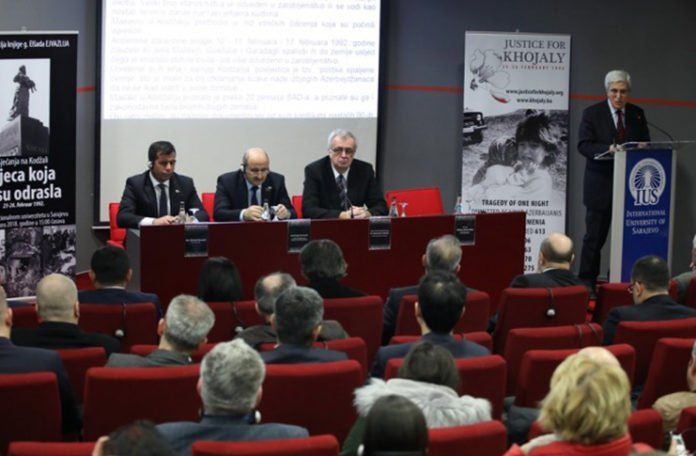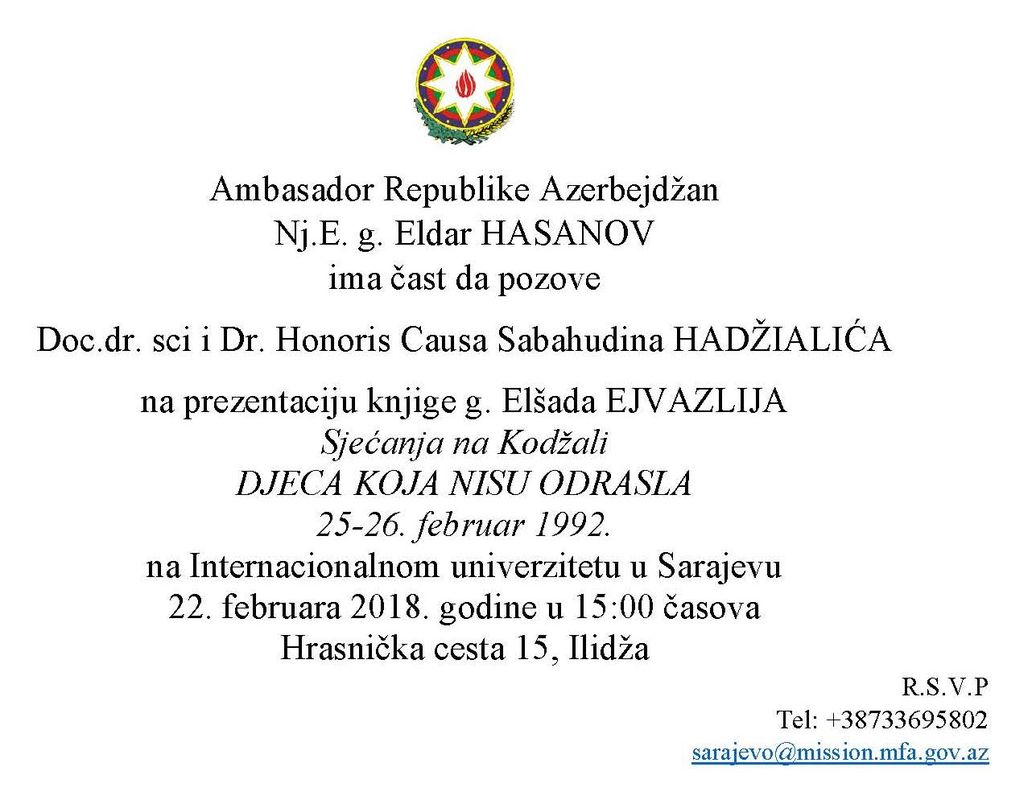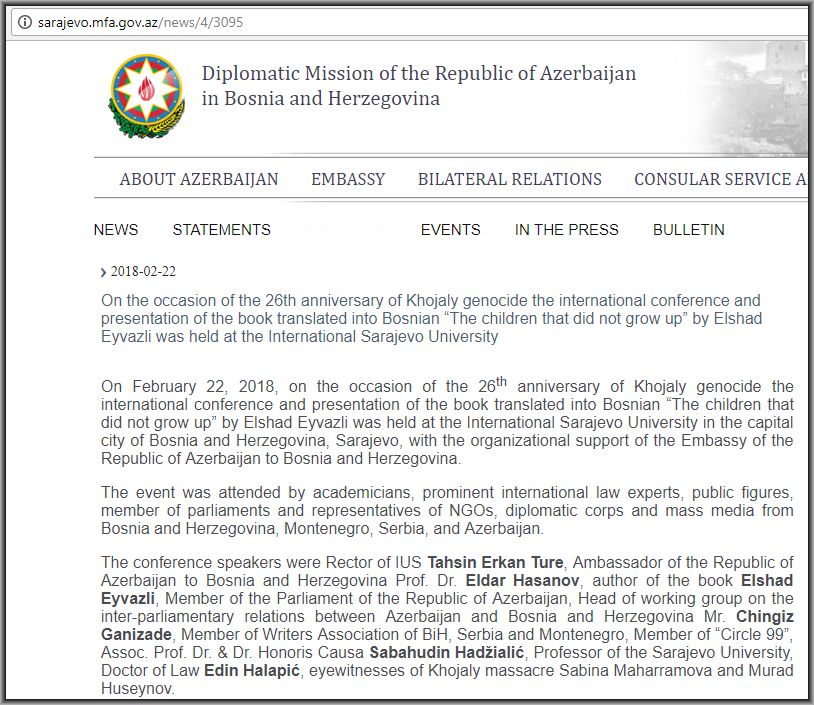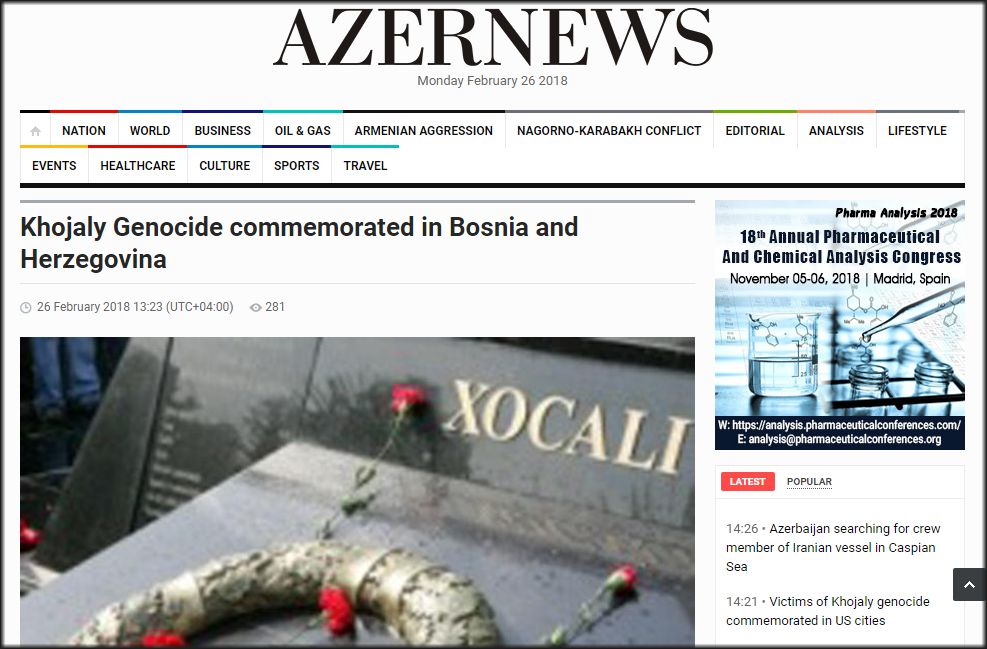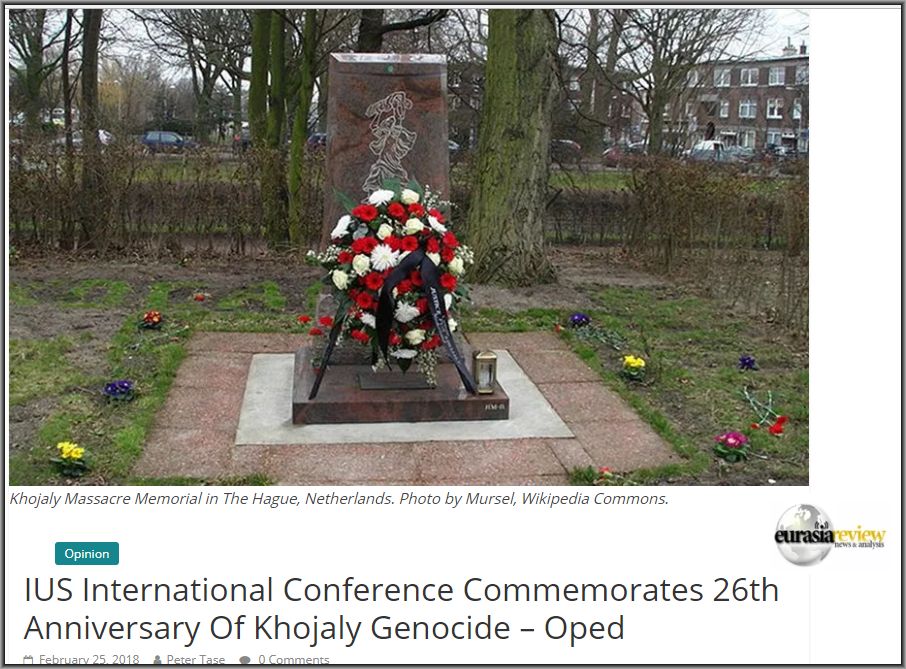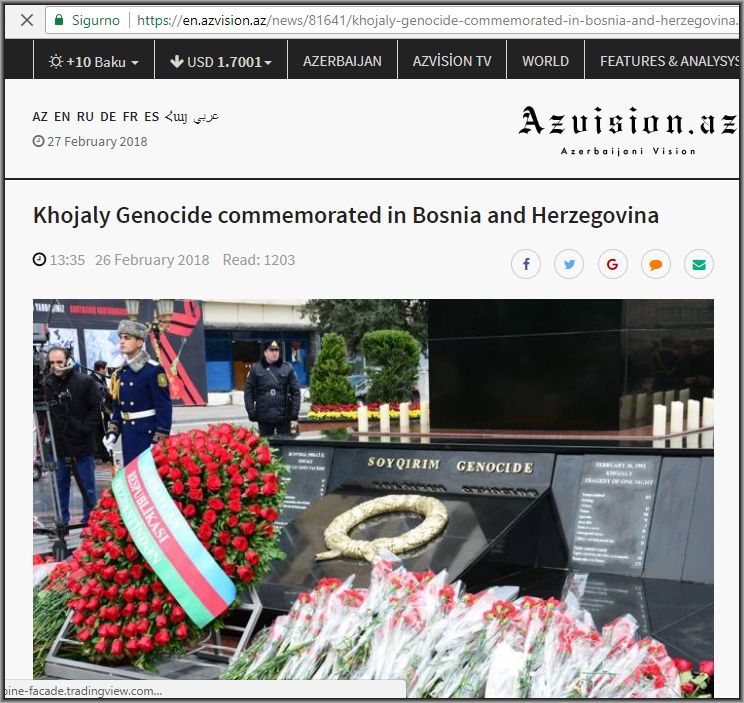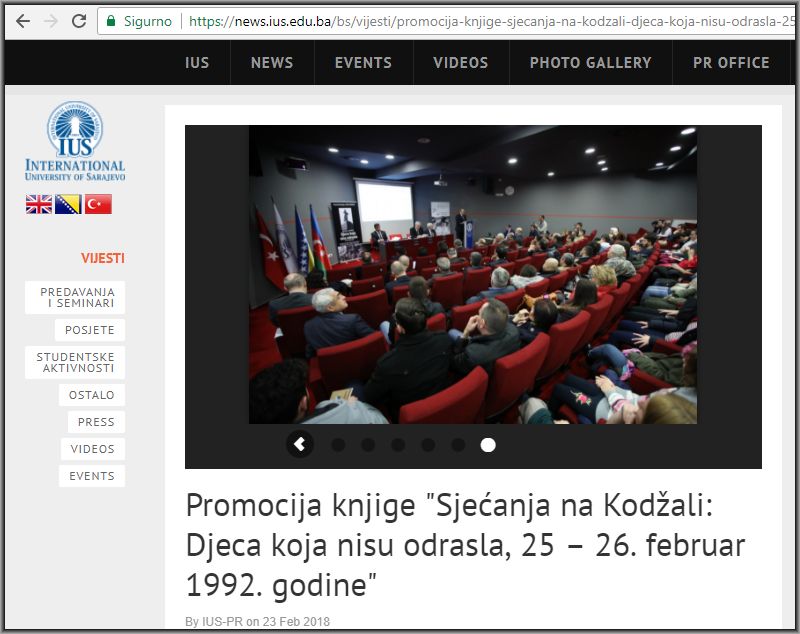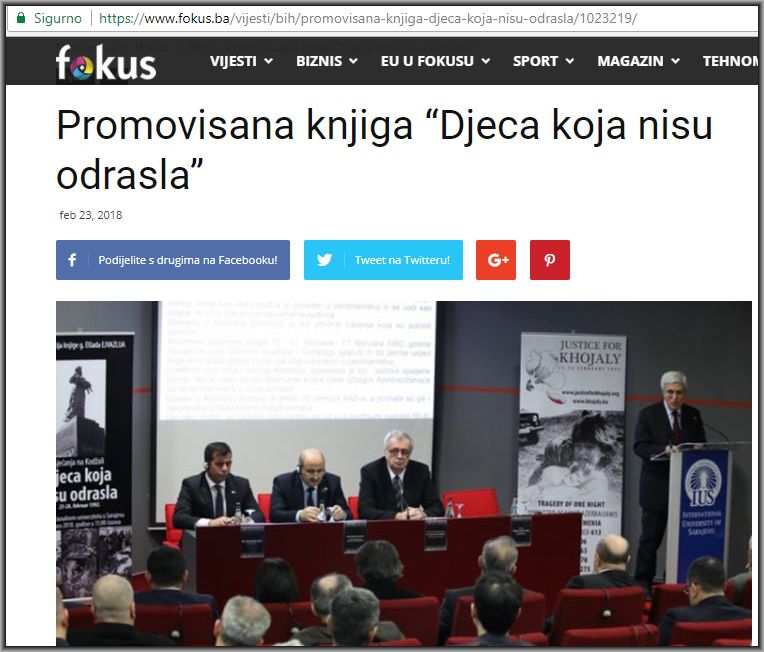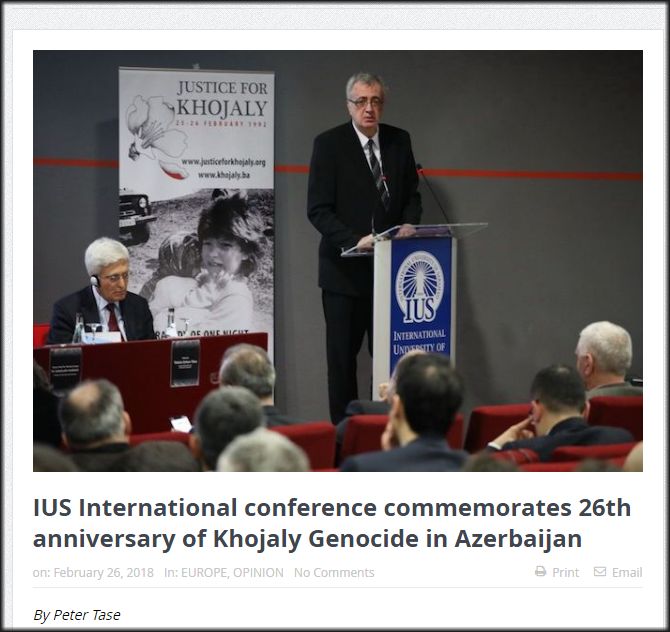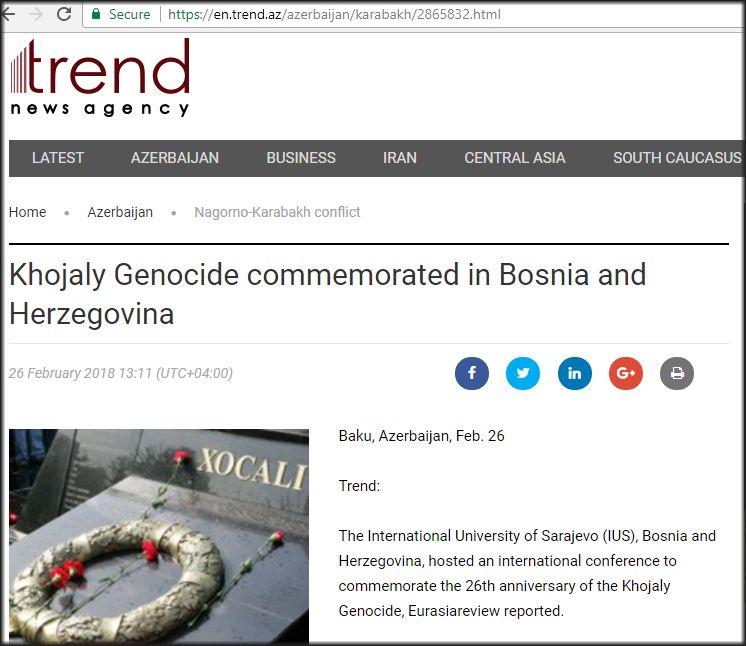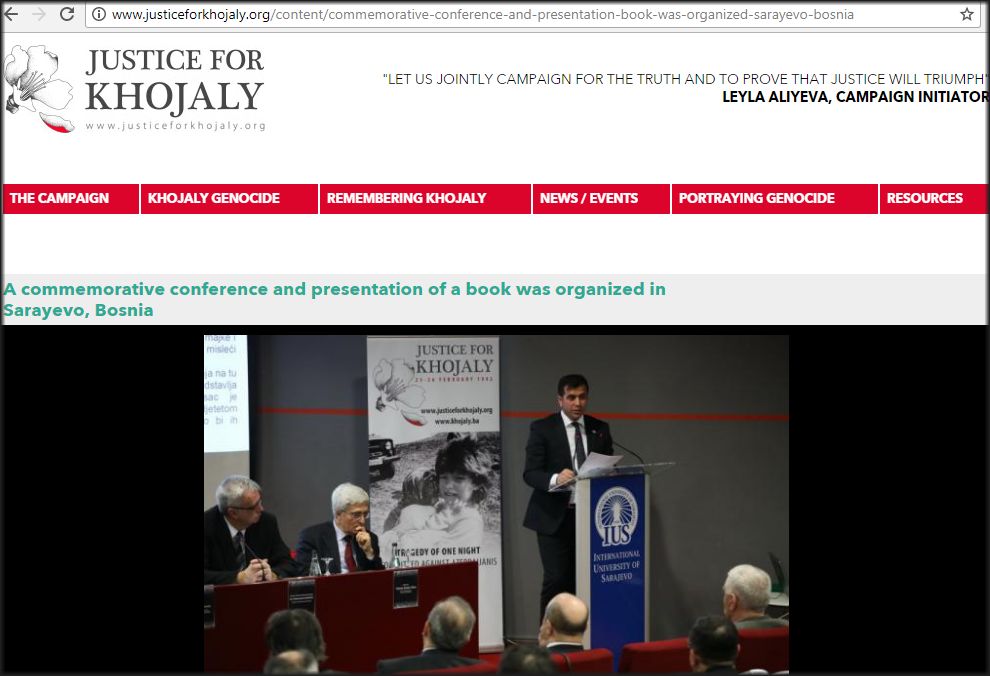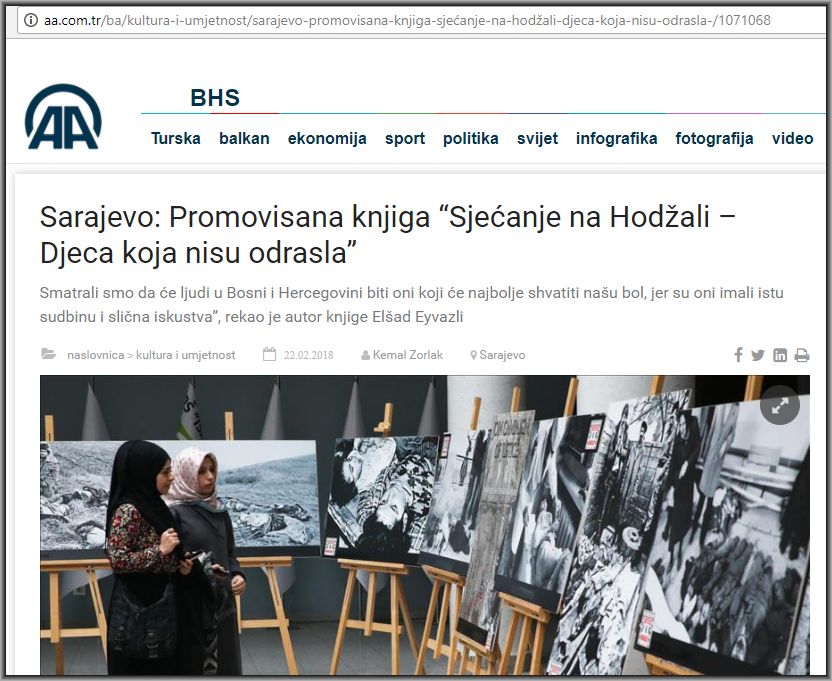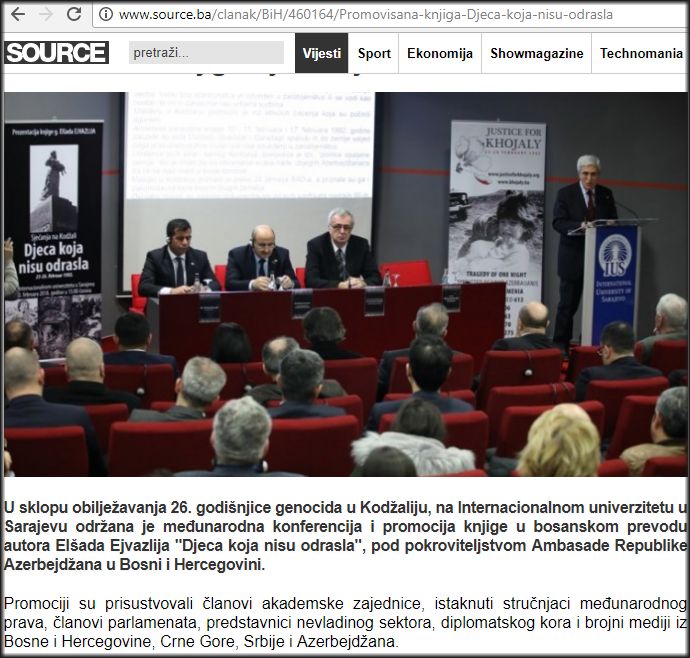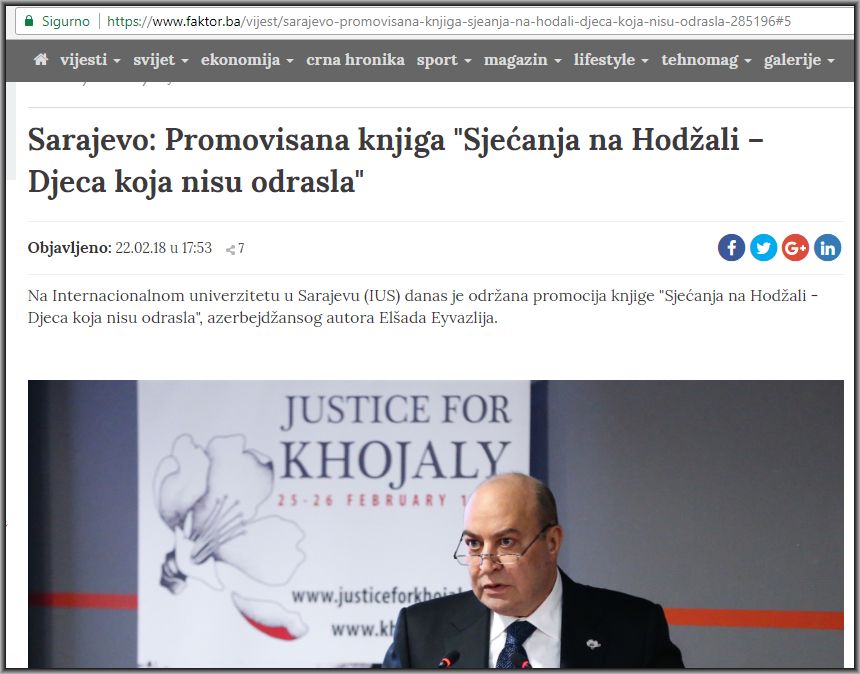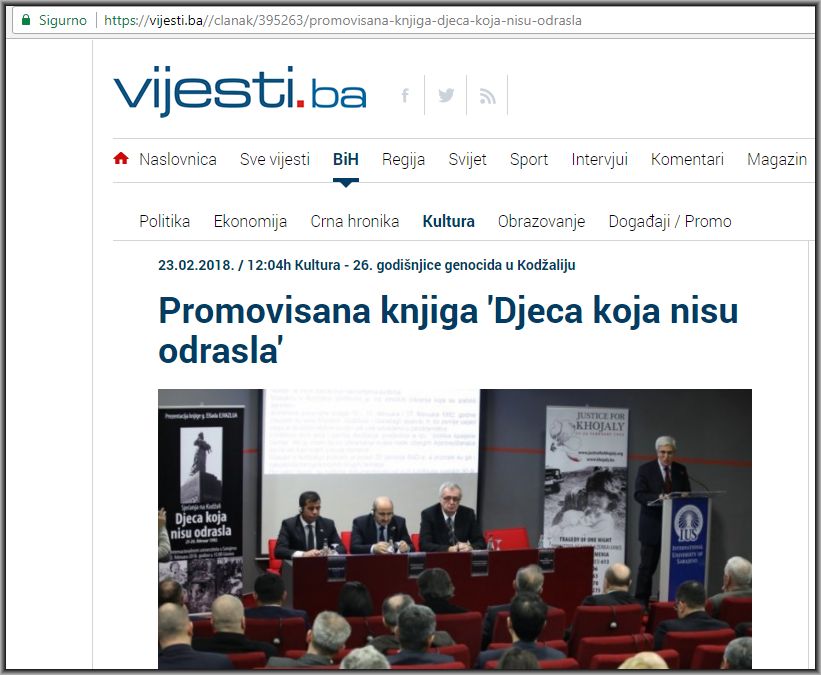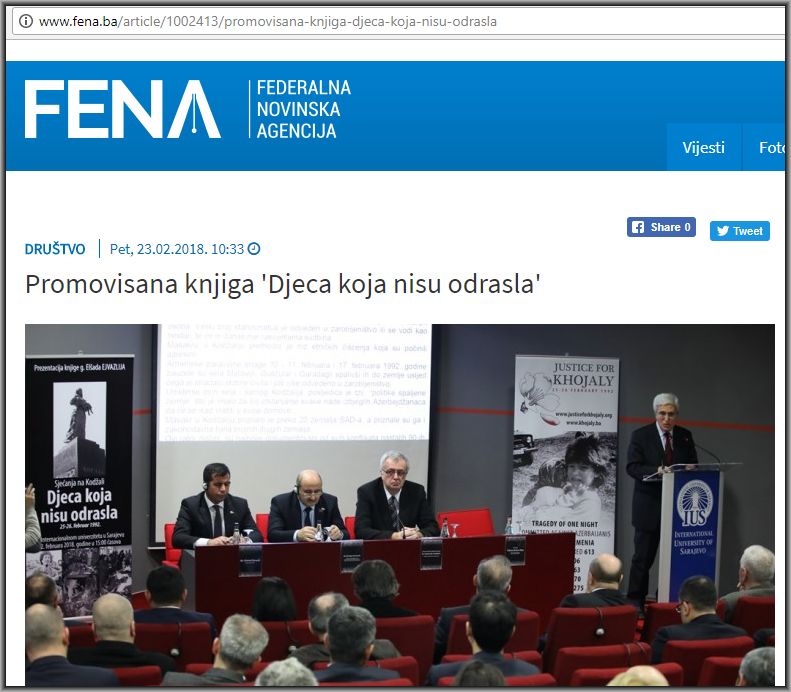22.02.2018.g.
PREDSTAVLJANJE KNJIGE
Elšad Ejvazli
„Sjećanja na Kodžali –
DJECA KOJA NISU ODRASLA“
pod pokroviteljstvom
Ambasade Republike Azerbejdžan
u Bosni i Hercegovini
Programme
| khojaly_book_-_22.02.18_-_programme.pdf | |
| File Size: | 152 kb |
| File Type: | |
Doc.dr.sc. & Dr. Honoris Causa Sabahudin Hadžialić, prof.
Tekst pročitan na predstavljanju knjige na IUS-u, 22.2.2018.g., Sarajevo, BiH
„Sjećanja na Kodžali – DJECA KOJA NISU ODRASLA“
Sjećanje je vječnost.
Upravo zbog uobličavanja pretpostavki koje obilježavaju vječnost globalne patnje samo zbog činjenice da je drugi i drugačiji neprijatelj koji treba nestati, bez mogućnosti pronalaženja kompromisa, kako sam, radi progresivnosti usmjerenosti ka opstojnosti ljudskoga bitka, i u mnoštvu prilika navodio da nam je potrebno „više komunikacije – manje konflikta“. Jer, tamo gdje nema komunikacije, nastaju mogućnosti prvo verbalnog, a zatim i fizičkog konflikta bez obzira gdje se nalazili na prostorima ovog našeg svijeta, ispunjenog kontinuiranih grijehom – upravo konflikta, koji samo mijenja oblike pojavnosti, dok u suštini ostaje i opstaje kao negacija humanosti per se.
Ni jednoga trenutka se nisam dvoumio da li da budem jedan od promotora ove tužne sage o patnji djece koja nisu odrasla iz Azerbejdžana, i to ne samo zbog toga što ni djeca ovih prostora, itekako veliki dio njih, nije odrastao upravo zbog patnje i surovosti kojoj su bili izloženi u ratovima devedesetih godina na prostorima bivše Jugoslavije, a posebno na prostoru naše domovine, Bosne i Hercegovine. Danas sam ovdje sa vama, jer to je obaveza svakog čovjeka koji svoje postojanje ne zasniva na isključivosti prema drugom i drugačijem već samo i jedino na usmjerenosti konačnog razumijevanja da smo svi crvene boje krvi ispod kože i da upravo ta boja krvi ne pravi razlike među ljudima, do ljudi sami.
Stradanje naroda Azerbejdžana, preko samo dijelom ispričane refleksije o patnji djece i njihovih porodica, ali i naroda Azerbejdžana u ovoj knjizi, autora Elshad EYVAZLija, je samo, nažalost, kontinuitet patnje koja obuhvaća ljudsku civilizaciju od njenog uobličavanja do dana današnjeg, od Holokausta tokom II Svjetskog rata i sve do dana današnjeg i genocida u Srebrenici - ali kako nazvati stradanje stotine i stotine nevinih u Kodžaliju krajem prošlog stoljeća? Ubistvom, masakrom ili etničkim čišćenjem, obzirom da ajet iz Kurana časnog kaže: „Ko god ubije jednog nevinog čovjeka, kao da je ubio cijeli svijet! Ko god spasi jednog čovjeka, kao da je spasio cijeli svijet!“
Gdje je civilizacija bila kada je svijet ubijan ne jednom već više hiljada puta u Srebrenici i drugim stratištima naroda u Bosni i Hercegovini?
Gdje je civilizacija bila kada je svijet ubijan ne jednom već više stotina puta u Kodžaliju u Azerbejdžanu?
Zaista sam bio iskreno ganut čitavši rekte ispovijesti ovih malih – velikih ljudi, djece koja nikada odrasla nisu. Neću govoriti o pojedinačnim bolima i patnjama navedenim u ovoj knjizi, jer svaka bol je posebna za sebe i zbog toga je zaista morate iščitati, a ne samo pročitati, jer je ova knjiga nedovršena, kontinuirana priča patnje. Svakim novim čitanjem stvara se nova bol, bol koja opstaje u vječnosti civilizacije kao kontinuitet.
No, vrijeme ne može ništa učiniti kada je bol Azerbejdžanske djece u pitanju. Obzirom da vrijeme ne prolazi, jer ne postoji. Mi, ljudi, prolazimo, jer smo postojali. Kako je jednom prilikom i jedan sarajevski sajdžija rekao:“Dok je ljudi, mjeriće se vrijeme.“ Da, kada ljudi budu nestali, vrijeme nestaje, ali patnja ostaje. I na prostorima Bosne i Hercegovine, ali i Azerbejdžana.
Kako prevazići patnju, barem pokušati?
Sjećanjem, koje prerasta u vječnost.
Poslušajte jedno od sjećanja navedeno u knjizi...citat: „Nismo imali našu majku, nismo imali našeg babu! Nismo mogli da budemo djeca! Djeca bi trebalo da imaju majku, da ih pazi. Nema veze... Bili smo toliko ljubomorni na djecu čiji su roditelji bili živi... Adalet i ja bili smo jedan uz drugog. Željeli smo da su nam roditelji živi, čak ako bismo morali i da prosimo i da se o njima brinemo.“..kraj citata.
Koliko samo boli i patnje u jednom paragrafu, roman je ovaj paragraf u samo par predstavljenih rečenica koje tužno odjekuju damarima moga duha.
Ove i ovakve knjige su obrazovanju potrebne. Ove i ovakve knjige su ljudima potrebne. Ne da bi mrzili druge i drugačije, već da bi spriječile ponavljanje istorije, koje je toliko bolno širom svijeta.
Moja preporuka je da ova knjiga bude prevedena na sve jezike svijeta. Radi dobrobiti čovječanstva kako se ovakve stvari nikada i nikome više ne bi ponovile, ali i da se ne zaborave, upravo zbog djece širom svijeta koja nikada odrasti neće.
Jer, sjećanje je vječnost.
Hvala vam.
Tekst pročitan na predstavljanju knjige na IUS-u, 22.2.2018.g., Sarajevo, BiH
„Sjećanja na Kodžali – DJECA KOJA NISU ODRASLA“
Sjećanje je vječnost.
Upravo zbog uobličavanja pretpostavki koje obilježavaju vječnost globalne patnje samo zbog činjenice da je drugi i drugačiji neprijatelj koji treba nestati, bez mogućnosti pronalaženja kompromisa, kako sam, radi progresivnosti usmjerenosti ka opstojnosti ljudskoga bitka, i u mnoštvu prilika navodio da nam je potrebno „više komunikacije – manje konflikta“. Jer, tamo gdje nema komunikacije, nastaju mogućnosti prvo verbalnog, a zatim i fizičkog konflikta bez obzira gdje se nalazili na prostorima ovog našeg svijeta, ispunjenog kontinuiranih grijehom – upravo konflikta, koji samo mijenja oblike pojavnosti, dok u suštini ostaje i opstaje kao negacija humanosti per se.
Ni jednoga trenutka se nisam dvoumio da li da budem jedan od promotora ove tužne sage o patnji djece koja nisu odrasla iz Azerbejdžana, i to ne samo zbog toga što ni djeca ovih prostora, itekako veliki dio njih, nije odrastao upravo zbog patnje i surovosti kojoj su bili izloženi u ratovima devedesetih godina na prostorima bivše Jugoslavije, a posebno na prostoru naše domovine, Bosne i Hercegovine. Danas sam ovdje sa vama, jer to je obaveza svakog čovjeka koji svoje postojanje ne zasniva na isključivosti prema drugom i drugačijem već samo i jedino na usmjerenosti konačnog razumijevanja da smo svi crvene boje krvi ispod kože i da upravo ta boja krvi ne pravi razlike među ljudima, do ljudi sami.
Stradanje naroda Azerbejdžana, preko samo dijelom ispričane refleksije o patnji djece i njihovih porodica, ali i naroda Azerbejdžana u ovoj knjizi, autora Elshad EYVAZLija, je samo, nažalost, kontinuitet patnje koja obuhvaća ljudsku civilizaciju od njenog uobličavanja do dana današnjeg, od Holokausta tokom II Svjetskog rata i sve do dana današnjeg i genocida u Srebrenici - ali kako nazvati stradanje stotine i stotine nevinih u Kodžaliju krajem prošlog stoljeća? Ubistvom, masakrom ili etničkim čišćenjem, obzirom da ajet iz Kurana časnog kaže: „Ko god ubije jednog nevinog čovjeka, kao da je ubio cijeli svijet! Ko god spasi jednog čovjeka, kao da je spasio cijeli svijet!“
Gdje je civilizacija bila kada je svijet ubijan ne jednom već više hiljada puta u Srebrenici i drugim stratištima naroda u Bosni i Hercegovini?
Gdje je civilizacija bila kada je svijet ubijan ne jednom već više stotina puta u Kodžaliju u Azerbejdžanu?
Zaista sam bio iskreno ganut čitavši rekte ispovijesti ovih malih – velikih ljudi, djece koja nikada odrasla nisu. Neću govoriti o pojedinačnim bolima i patnjama navedenim u ovoj knjizi, jer svaka bol je posebna za sebe i zbog toga je zaista morate iščitati, a ne samo pročitati, jer je ova knjiga nedovršena, kontinuirana priča patnje. Svakim novim čitanjem stvara se nova bol, bol koja opstaje u vječnosti civilizacije kao kontinuitet.
No, vrijeme ne može ništa učiniti kada je bol Azerbejdžanske djece u pitanju. Obzirom da vrijeme ne prolazi, jer ne postoji. Mi, ljudi, prolazimo, jer smo postojali. Kako je jednom prilikom i jedan sarajevski sajdžija rekao:“Dok je ljudi, mjeriće se vrijeme.“ Da, kada ljudi budu nestali, vrijeme nestaje, ali patnja ostaje. I na prostorima Bosne i Hercegovine, ali i Azerbejdžana.
Kako prevazići patnju, barem pokušati?
Sjećanjem, koje prerasta u vječnost.
Poslušajte jedno od sjećanja navedeno u knjizi...citat: „Nismo imali našu majku, nismo imali našeg babu! Nismo mogli da budemo djeca! Djeca bi trebalo da imaju majku, da ih pazi. Nema veze... Bili smo toliko ljubomorni na djecu čiji su roditelji bili živi... Adalet i ja bili smo jedan uz drugog. Željeli smo da su nam roditelji živi, čak ako bismo morali i da prosimo i da se o njima brinemo.“..kraj citata.
Koliko samo boli i patnje u jednom paragrafu, roman je ovaj paragraf u samo par predstavljenih rečenica koje tužno odjekuju damarima moga duha.
Ove i ovakve knjige su obrazovanju potrebne. Ove i ovakve knjige su ljudima potrebne. Ne da bi mrzili druge i drugačije, već da bi spriječile ponavljanje istorije, koje je toliko bolno širom svijeta.
Moja preporuka je da ova knjiga bude prevedena na sve jezike svijeta. Radi dobrobiti čovječanstva kako se ovakve stvari nikada i nikome više ne bi ponovile, ali i da se ne zaborave, upravo zbog djece širom svijeta koja nikada odrasti neće.
Jer, sjećanje je vječnost.
Hvala vam.
English:
Assoc. Prof. Dr. & Dr. Honoris Causa Sabahudin Hadžialic
Text to read on promotion of the book at IUS, February 22, 2018
"Memories of Khojaly - CHILDREN WHO DID NOT grow UP"
Memory is an eternity.
Precisely because of the formulation of the assumptions that marks the eternity of global suffering only because of the fact that the other and the different is the enemy who needs to disappear, without the possibility of finding a compromise, as I mentioned, for the advancement of the focus on the survival of the human being, in many occasions that we need „more communication - less conflicts ". Because, where there is no communication, the possibilities of the first verbal and then of physical conflict are created, no matter where they are in the area of our world, filled with sin – exactly of the conflict, which only changes the forms of appearance, while in essence remains and survives as the negation of humanity for itself (per se).
At one point I did not ask myself if I should be one of the promoters of this sad sage about the suffering of children who did not grow up from Azerbaijan, not only because that even the children of these areas, many of them, did not grow up precisely because of the suffering and cruelty to which they were exposed in the wars of the 1990s on the territory of the former Yugoslavia, especially in the area of our homeland, Bosnia and Herzegovina. Today, I am here with you, because it is the duty of every man who does not rely his existence on the exclusiveness towards the other and different but only and only on the directness of the ultimate understanding that we all have red color of our blood under the skin and that precisely that color of blood does not make differences between people, but the people itself.
A suffering of the Azerbaijani people, through telling only a fraction of the reflection on the suffering of children and their families, but also of the people of Azerbaijan in this book, by author Elshad EYVAZLI, is merely a continuation of suffering that encompasses human civilization since its appearance, from the Holocaust during The World War II and to the present day and the genocide in Srebrenica - but how to call the hundreds and hundreds of innocent victims in Hodzali at the end of the last century? Killing, massacre, or ethnic cleansing, having in mind that the Quranic verse says: "Whoever kills an innocent man as if he killed the whole world! Whoever saves a man, as if he has saved the whole world! "
Where was the civilization when the world was murdered not once but more thousands of times in Srebrenica and other strata of peoples in Bosnia and Herzegovina?
Where was the civilization when the world was murdered not once but more hundreds of times in Khojaly in Azerbaijan?
Indeed, I have been sincerely touched those lines of this little - great people, children who never grew up. I'm not going to talk about the individual pain and suffering mentioned in this book because every pain is special to itself and that's why you really have to read through it, not just read it, because this book is an unfinished, continuous story of suffering. Every new reading creates a new pain, a pain that survives in the eternity of civilization as a continuum.
But time can not do anything when the pain of Azerbaijani children is at stake. Since time does not pass because it does not exist. We, humans, pass, because we existed. As one occasion at a Sarajevo one watchmaker said, "Until people exist, time will be measured." Yes, when people are gone, time disappears, but suffering remains. Both in Bosnia and Herzegovina and in Azerbaijan.
How to overcome suffering, at least try?
With memory, which is transformed into eternity.
Listen to one of the memories in the book ... quote: "We did not have our mother, we did not have our dad! We could not be kids! Children should have their mother to look after them. No matter ... We were so jealous of children whose parents were alive ... Adalet and I were one to the other. We wanted our parents to be alive, even if we had to beg and care for them. "..end of quote.
As much of the pain and suffering in one paragraph, this paragraph is a novel in just a few of the sentences that are resonating with the nails of my spirit.
These and such books are needed for education. These and these books are needed for people. Not to hate others and different ones, but to prevent a repetition of history that is so painful all over the world.
My recommendation is that this book should be translated into all languages of the world. For the sake of humanity, how these things will never and to nobody be repeated to anyone, but also not forgotten, just because of children who will never grow up around the world.
Because the memory is an eternity.
Thank you.
Assoc. Prof. Dr. & Dr. Honoris Causa Sabahudin Hadžialic
Text to read on promotion of the book at IUS, February 22, 2018
"Memories of Khojaly - CHILDREN WHO DID NOT grow UP"
Memory is an eternity.
Precisely because of the formulation of the assumptions that marks the eternity of global suffering only because of the fact that the other and the different is the enemy who needs to disappear, without the possibility of finding a compromise, as I mentioned, for the advancement of the focus on the survival of the human being, in many occasions that we need „more communication - less conflicts ". Because, where there is no communication, the possibilities of the first verbal and then of physical conflict are created, no matter where they are in the area of our world, filled with sin – exactly of the conflict, which only changes the forms of appearance, while in essence remains and survives as the negation of humanity for itself (per se).
At one point I did not ask myself if I should be one of the promoters of this sad sage about the suffering of children who did not grow up from Azerbaijan, not only because that even the children of these areas, many of them, did not grow up precisely because of the suffering and cruelty to which they were exposed in the wars of the 1990s on the territory of the former Yugoslavia, especially in the area of our homeland, Bosnia and Herzegovina. Today, I am here with you, because it is the duty of every man who does not rely his existence on the exclusiveness towards the other and different but only and only on the directness of the ultimate understanding that we all have red color of our blood under the skin and that precisely that color of blood does not make differences between people, but the people itself.
A suffering of the Azerbaijani people, through telling only a fraction of the reflection on the suffering of children and their families, but also of the people of Azerbaijan in this book, by author Elshad EYVAZLI, is merely a continuation of suffering that encompasses human civilization since its appearance, from the Holocaust during The World War II and to the present day and the genocide in Srebrenica - but how to call the hundreds and hundreds of innocent victims in Hodzali at the end of the last century? Killing, massacre, or ethnic cleansing, having in mind that the Quranic verse says: "Whoever kills an innocent man as if he killed the whole world! Whoever saves a man, as if he has saved the whole world! "
Where was the civilization when the world was murdered not once but more thousands of times in Srebrenica and other strata of peoples in Bosnia and Herzegovina?
Where was the civilization when the world was murdered not once but more hundreds of times in Khojaly in Azerbaijan?
Indeed, I have been sincerely touched those lines of this little - great people, children who never grew up. I'm not going to talk about the individual pain and suffering mentioned in this book because every pain is special to itself and that's why you really have to read through it, not just read it, because this book is an unfinished, continuous story of suffering. Every new reading creates a new pain, a pain that survives in the eternity of civilization as a continuum.
But time can not do anything when the pain of Azerbaijani children is at stake. Since time does not pass because it does not exist. We, humans, pass, because we existed. As one occasion at a Sarajevo one watchmaker said, "Until people exist, time will be measured." Yes, when people are gone, time disappears, but suffering remains. Both in Bosnia and Herzegovina and in Azerbaijan.
How to overcome suffering, at least try?
With memory, which is transformed into eternity.
Listen to one of the memories in the book ... quote: "We did not have our mother, we did not have our dad! We could not be kids! Children should have their mother to look after them. No matter ... We were so jealous of children whose parents were alive ... Adalet and I were one to the other. We wanted our parents to be alive, even if we had to beg and care for them. "..end of quote.
As much of the pain and suffering in one paragraph, this paragraph is a novel in just a few of the sentences that are resonating with the nails of my spirit.
These and such books are needed for education. These and these books are needed for people. Not to hate others and different ones, but to prevent a repetition of history that is so painful all over the world.
My recommendation is that this book should be translated into all languages of the world. For the sake of humanity, how these things will never and to nobody be repeated to anyone, but also not forgotten, just because of children who will never grow up around the world.
Because the memory is an eternity.
Thank you.
News - klikom na fotke otvarate info
| cv_sabahudin_hadzialic_2018_.pdf | |
| File Size: | 807 kb |
| File Type: | |
| sabahudin_hadzialic_biografija_2018.pdf | |
| File Size: | 270 kb |
| File Type: | |
Assoc. Prof. Dr. & Dr. Honoris Causa Sabahudin Hadžialić,
Grbavička 32, 71000 Sarajevo (i/ili Dr. Wagnera 18, 70230, Bugojno),
Bosna i Hercegovina. Kontakt +387 63 111 052 i/ili [email protected]
|
Istaknuti samostalni umjetnik Rješenjem (Broj: 12-40-14384/16)
Ministra kulture i sporta Kantona Sarajevo od 19.2.2016. Istaknuti samostalni umjetnik od 1.1.2009 također odlukom nadležnog Ministarstva |
Prominent self sustained artist through Decision (No: 12-40-14384/16)
by the Minister of culture and sport of Canton Sarajevo since 19.2.2016. Prominentn self sustained artist as of 1.1.2009 also by the decision of authorized Ministry |
| registar_istaknutih_samostalnih_umjetnika_2017.pdf | |
| File Size: | 61 kb |
| File Type: | |
